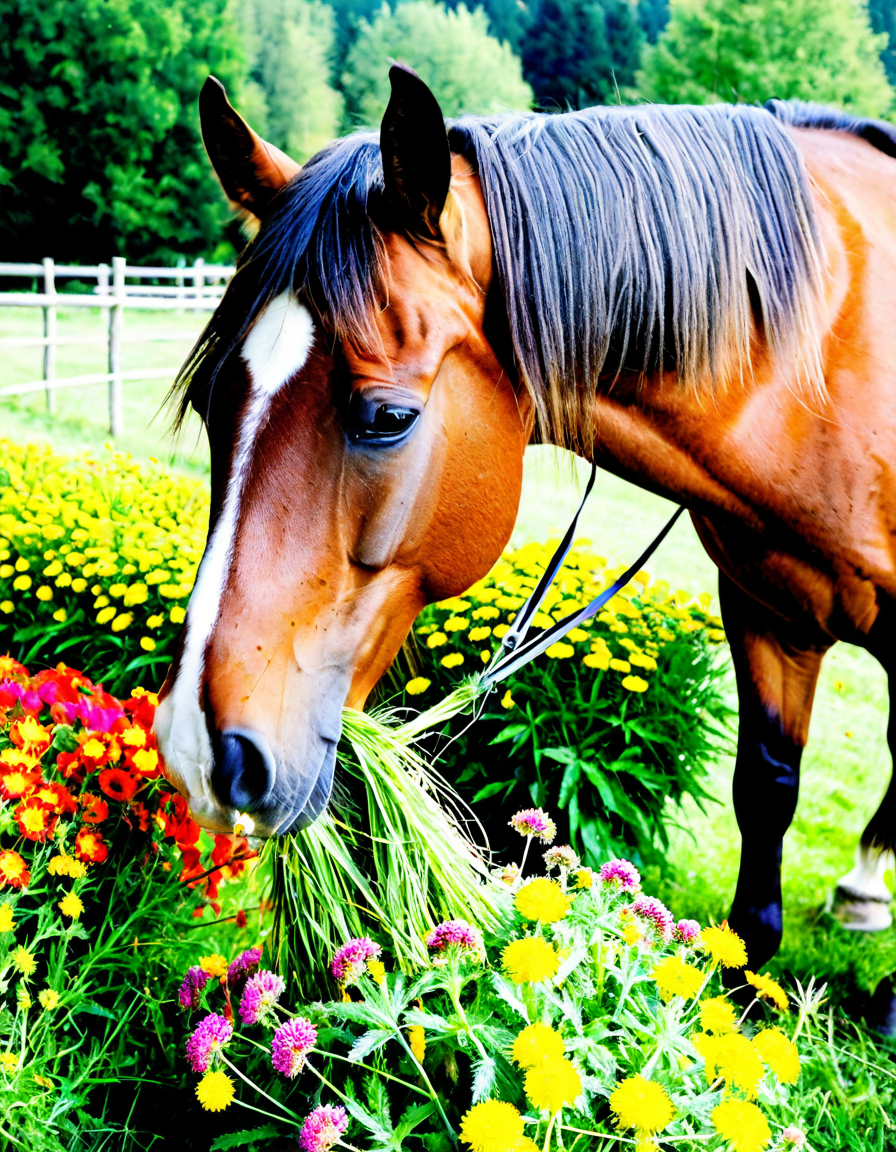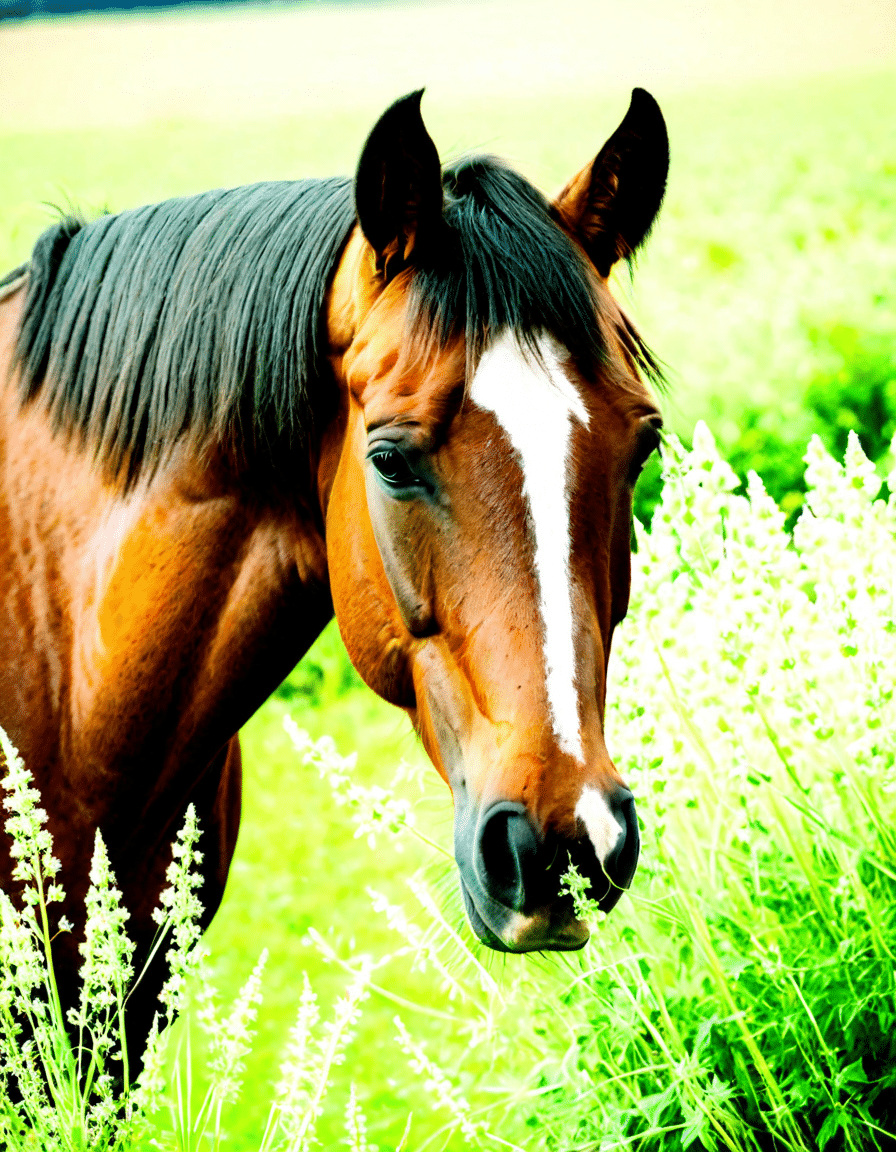As horse owners, it’s essential to address concerns about our equine friends’ dietary habits. A common inquiry that pops up is, “can eating weeds make a horse stiff?” It’s a valid question, considering the wide variety of plants horses might stumble upon while grazing. While horses are notoriously selective eaters, they can occasionally munch on weeds that turn out to be harmful. Recognizing the risks associated with weeds is crucial for maintaining your horse’s health and mobility.
In this detailed guide, we’ll explore the five most notorious weeds that can lead to stiffness and painful issues in horses. We’ll also delve into the broader context of factors that contribute to stiffness in these majestic animals, and how proper care and attention can help prevent potential problems.
Top 5 Weeds That Could Potentially Cause Stiffness in Horses
While grazing seems benign, certain weeds can wreak havoc on a horse’s health. Here are five notorious offenders that every horse owner should keep an eye out for!
1. Tansy Ragwort
Tansy ragwort may look innocent, but this perennial weed can cause significant liver damage when consumed over time. Horses usually don’t touch it unless they’re starving or it’s mixed in with other forage. Over time, ingesting this plant can result in stiffness, pain, and a noticeable drop in performance.
Liver dysfunction is a major red flag. When the liver isn’t functioning correctly, a horse can’t detoxify efficiently. As a result, this condition may translate into muscle and joint pain, causing that dreaded stiffness.
2. Bitterweeds
Bitterweeds are notorious for their alkaloid content, which can induce inflammation in horses. If horses consume large quantities of these weeds, they may experience stiffness and lingering muscle pain. Studies have shown that the effects of bitterweeds can linger in a horse’s system, leading to chronic discomfort long after the weeds have been eaten.
To prevent issues, make sure to remove these weeds from pastures and monitor what your horse is ingesting.
3. Yellow Star Thistle
Primarily found in the western United States, yellow star thistle can lead to a peculiar condition referred to as “chewing disease.” While this condition affects neuromuscular functions more directly than it impacts stiffness, the associated discomfort can certainly cause horses to become hesitant in movement. If your horse is struggling to chew or shows discomfort when eating, it may result in awkward postures that manifest as stiffness.
4. Red Root Pigweed
This weed isn’t usually harmful in small amounts but can become a problem with excessive consumption. Red Root Pigweed is high in oxalates, which bind to calcium and can impact joint health. When versatility in movement is compromised, you’ll likely see signs of stiffness appearing.
Keep an eye on your horse’s grazing habits and be proactive in managing their diet to minimize the risks associated with seemingly innocent greenery.
5. Canada Thistle
While Canada thistle may look harmless, it’s an irritant that can lead to colic in horses. Colic can cause bizarre postures as horses attempt to manage their discomfort, resulting in stiffness in their limbs and back. The key is to intervene quickly, ensuring your horse is receiving proper care and dietary management.

Assessing the Impact of Weeds on Your Horse’s Health
Horse owners play a vital role in recognizing and managing the impact of various weeds on their equine companions’ health. Regular monitoring of pastures and a keen eye for unusual behavior are essential. If that nagging question of “can eating weeds make a horse stiff?” lingers, then it’s time to act.
If any signs of stiffness or discomfort become apparent, consulting with a veterinarian should be a priority. They can provide insight into any underlying conditions that may need attention beyond just pesky weeds.
What Else Affects Stiffness in Horses?
It’s essential to note that dietary issues aren’t the sole culprits behind stiffness. Several other factors can contribute to a horse’s discomfort, including:
Addressing these health issues requires a comprehensive approach. Just like how one might wonder, “does black widow drink water?”—understanding hydration and supportive care is key here as well.
Observing Hydration Habits
A curious tidbit for animal lovers: black widow spiders procure moisture mostly from their prey. Horses, too, require proper hydration to maintain muscular health and minimize stiffness. Just like feeding your horse the right forage can impact their well-being, providing adequate water plays a vital role in their overall comfort.
Analogies with Other Pets
We can even draw parallels from keeping other pets, like how you might wonder, “what do bearded dragons need for basking?” While these exotic creatures have specific needs for basking and humidity, horses similarly thrive when provided with the right living conditions—clean water and proper nutrition are crucial!
Take another example: “how can I help my bearded dragon shedding?” Just like proper humidity aids shedding in reptiles, ensuring horses have access to healthy forage and a clean environment helps keep them mobile and pain-free.
Holistic Care for Better Well-Being
The health of your horse is an intricate puzzle. Just as you might ask, “do bearded dragons need a basking rock?” the answer impacts your pet’s happiness and health. With horses, it’s about removing harmful weeds, providing a nutritious diet, and monitoring their overall environment. Addressing discomfort and stiffness matters significantly in ensuring your horse lives a healthier, happier life.

A Holistic Approach to Preventing Stiffness in Horses
Given the risks associated with harmful weed consumption, adopting a vigilant approach to managing your horse’s diet and environment cannot be overstated.
Horse owners are encouraged to educate themselves about what their horses are grazing on. Being proactive—removing harmful plants and providing a balanced diet—can mitigate many potential problems before they come to light.
Ultimately, just like caring for a black widow spider’s hydration needs—monitoring environment and resources for horses leads to preventive health care. This holistic perspective fosters not only reduced instances of stiffness but a happier, healthier horse overall.
By staying aware of dietary risks and ensuring proper care, you can effectively navigate the journey of horse ownership, ensuring that your companion remains mobile and enjoys life to the fullest.
Can Eating Weeds Make a Horse Stiff?
When we think about horse health, the diet often comes up, and rightly so! It’s essential to know what these majestic creatures can (and can’t) safely munch on. So, can eating weeds make a horse stiff? Absolutely, it can! Certain weeds, like those that are rich in oxalates or have toxic properties, can lead to stiffness and pain due to their effects on the muscles and joints. Like how Yzma from The Emperor’s New Groove concocts her wild schemes, nature’s weeds can bring surprising problems to unsuspecting horses when consumed.
Weeds and Horse Health
Surprisingly, not all weeds are created equal. Some might even boost a horse’s health! But the dangerous ones can lead to conditions like muscle stiffness or even internal issues. For instance, consuming weeds like ragwort or sagebrush can wreak havoc on their systems. Just like the notorious Christmas Cactus And Cats situation, where plant choices can inadvertently harm pets, horse owners need to be vigilant about what’s in their pastures.
Recognizing the Signs
If a horse is limping or struggling to move as they usually would, it’s vital to dive into their diet—have they been munching on unfamiliar greens lately? This sounds a lot like the drama in The Traitors Season 1, where the unexpected twists catch everyone off guard! Keep an eye on their behavior. A sudden change can signal that something isn’t right, much like finding the despair definition in an unknown situation adds context.
By maintaining a keen awareness of what your horse eats, you’ll not only prevent painful issues but also promote their overall wellness. After all, who wouldn’t want their equine friend to frolic without a care? And speaking of nutrition, horse owners should always be asking themselves questions about quality—it’s akin to figuring out if Chewy’s quality of dog food decreased over time. Good choices lead to happy, healthy horses! So, while the open field may look inviting with all sorts of weeds, a little research goes a long way to keeping your horse proud and lively.



